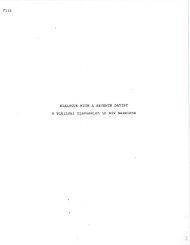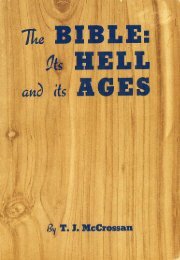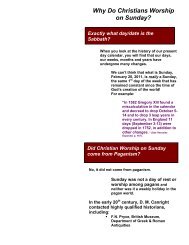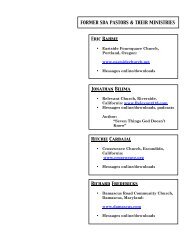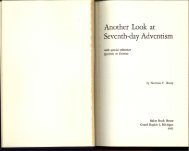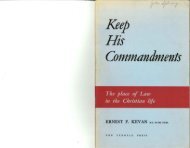Discovering the New Covenant by Greg Taylor - exAdventist Outreach
Discovering the New Covenant by Greg Taylor - exAdventist Outreach
Discovering the New Covenant by Greg Taylor - exAdventist Outreach
You also want an ePaper? Increase the reach of your titles
YUMPU automatically turns print PDFs into web optimized ePapers that Google loves.
DISCOVERING THE NEW COVENANT<br />
There are those that make Sunday into a binding<br />
Sabbath requirement. As I understand <strong>the</strong> Scriptures, Sunday<br />
sabbatarianism is just as problematic as Saturday sabbatarianism.<br />
It is not wrong to observe a day. It is wrong to judge<br />
o<strong>the</strong>rs for <strong>the</strong>ir decisions regarding observance or non-observance<br />
of days. It is wrong to, in any way, get such practices<br />
confused with salvation.<br />
How did it happen that most Christians started worshipping<br />
on Sunday, <strong>the</strong>n? It was interesting for me to discover<br />
<strong>the</strong> early church process with this. In an exhaustive study on<br />
<strong>the</strong> issue of Sabbath and Sunday, D.A. Carson, edits a book<br />
entitled From Sabbath to <strong>the</strong> Lord’s Day. This book is a<br />
scholarly and highly technical work that examines <strong>the</strong> early<br />
church fa<strong>the</strong>rs and <strong>the</strong>ir views about Sabbath and Sunday<br />
worship.<br />
From 100 A.D. forward <strong>the</strong> earliest Christians<br />
unanimously met on Sunday. This was a universal practice<br />
among Christians. No one considered it a Sabbath. But<br />
virtually all Christians met on that day. This historical reality<br />
is much earlier than Adventists have taught. These Sunday<br />
worship ga<strong>the</strong>rings were universally accepted practice<br />
among <strong>the</strong> disciples of <strong>the</strong> apostles. It is unthinkable that this<br />
could have happened without having been <strong>the</strong> general<br />
practice during <strong>the</strong> apostolic era. Again I want to say that <strong>the</strong><br />
early Christians thought it was a good day to meet because it<br />
celebrated <strong>the</strong> resurrection, but <strong>the</strong>y did not associate it with<br />
a change of <strong>the</strong> seventh-day Sabbath. Some, however,<br />
continued to meet on <strong>the</strong> seventh-day Sabbath. These were<br />
mostly <strong>the</strong> Jewish Christians. O<strong>the</strong>rs, mostly Gentiles, did<br />
continuance in <strong>the</strong> <strong>New</strong> Testament. A second group teaches a<br />
transference <strong>the</strong>ology and states that <strong>the</strong> Sabbath command is still<br />
binding, but sacredness of <strong>the</strong> day was transferred from Sabbath to<br />
Sunday. (This was actually a much later development in <strong>the</strong> Christian<br />
church. Early Christians did not teach ei<strong>the</strong>r of <strong>the</strong>se first two concepts.)<br />
Finally <strong>the</strong>re is a larger group of Christians that teach that Jesus fulfilled<br />
<strong>the</strong> Sabbath and <strong>the</strong> Law. He is our Sabbath rest.<br />
132



